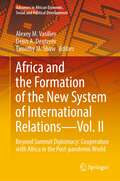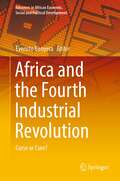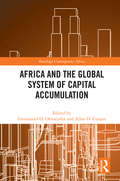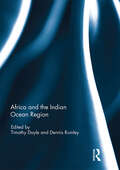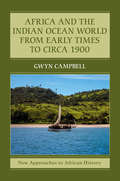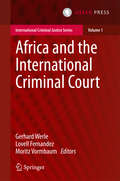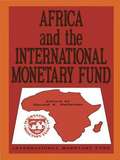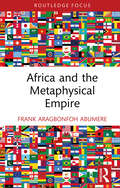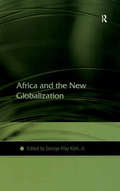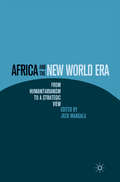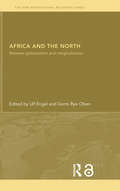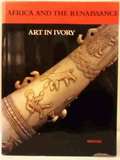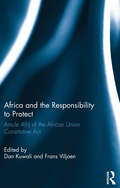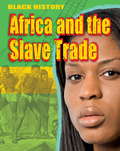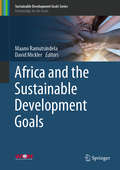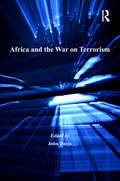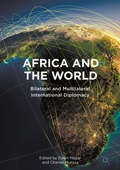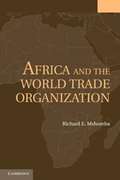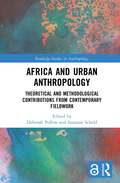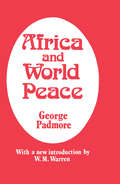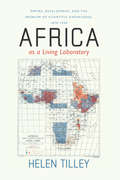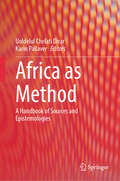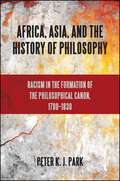- Table View
- List View
Africa and the Formation of the New System of International Relations—Vol. II: Beyond Summit Diplomacy: Cooperation with Africa in the Post-pandemic World (Advances in African Economic, Social and Political Development)
by Alexey M. Vasiliev Denis A. Degterev Timothy M. ShawIn light of the growing number of African summits and a new awareness of international interdependence during the COVID-19 pandemic, this book provides a comprehensive analysis of the current state of Africa’s international relations (IR). Leading IR scholars from Africa and around the world examine international cooperation with African countries in areas such as health care, education, and peacekeeping and explore how Africa’s role in the system of international relations has changed during the COVID-19 pandemic.The book is divided into four parts, the first of which explores analyzes the various actors that constitute African agency in the post-pandemic world, while the second focuses on the summits of the major powers regarding cooperation with Africa. The third part covers public health cooperation and regional initiatives in Africa, including issues such as vaccine diplomacy, while the fourth and final part discusses conflicts & political process despite COVID Pandemics.
Africa and the Fourth Industrial Revolution: Curse or Cure? (Advances in African Economic, Social and Political Development)
by Everisto BenyeraThis book examines the epistemological, political, and socio-economic consequences of the Fourth Industrial Revolution (4IR) for Africa. Presenting various case studies on epistemic freedom, theology, race and robotics, tertiary education, political and economic transformation, human capital, and governance, it debates whether the 4IR will be part of the solution to the African problem, namely that of coloniality in its various forms. Solving the African problem using the 4IR requires ethical, just and epistemologically independent leadership. However, the lack of ICT infrastructure militates against Africa’s endeavours to make the 4IR a problem-solving moment. To its credit, Africa possesses some of the major capital needed (human, mineral, and social), and it constitutes a huge market comprising a young population eager to participate in the 4IR as problem-solvers and not as a problem to be solved—as equal citizens and not as the marginalized other.
Africa and the Global System of Capital Accumulation (Routledge Contemporary Africa)
by Emmanuel O. OritsejaforAfrica and the Global System of Capital Accumulation offers a groundbreaking analysis of the strategic role Africa plays in the global capitalist economy. The exploitation of Africa’s rich resources, as well as its labor, make it possible for major world powers to sustain their authority over their own middle-class populations while rewarding African collaborators in leadership positions for subjecting their populations into poverty and desperation. Middle-class obsessions such as computers, mobile phones, cars and the petroleum that fuels them, diamonds, chocolate – all of these products require African resources that are typically obtained by child or slave labor that helps to generate billionaires out of foreign investors while impoverishing most Africans. Oritsejafor and Cooper demonstrate that "primitive accumulation," believed by both Adam Smith and Karl Marx to be a process that precedes capitalism, is actually an integral part of capitalism. They also validate the thesis that capitalism incorporates racism as an organizing tool for the exploitation of labor in Africa and on a global scale. Case studies are presented on Nigeria, Cote d’Ivoire, Ghana, Liberia, Congo, Tanzania, Somalia, Angola, Namibia, Sao Tome and Principe, and South Sudan. There are also chapters analyzing the interests of Russia and China in Africa. This book will be of interest to students and scholars of African politics, development, and economics.
Africa and the ICC
by Clarke Kamari M. Knottnerus Abel S. De Volder EefjeAfrica and the ICC: Realities and Perceptions comprises contributions from prominent scholars of different disciplines including international law, political science, cultural anthropology, African history and media studies. This unique collection provides the reader with detailed insights into the interaction between the African Union and the International Criminal Court (ICC), but also looks further at the impact of the ICC at a societal level in African states and examines other justice mechanisms on a local and regional level in these countries. This investigation of the ICC's complicated relationship with Africa allows the reader to see that perceptions of justice are multilayered.
Africa and the Indian Ocean Region
by Timothy Doyle Dennis RumleyThis book examines the presence of Africa as a significant force in the western Indian Ocean. Africa will increasingly play a pivotal role in the future of the geopolitics of the Indian Ocean region. The book considers the scope for greater African involvement in Indian Ocean region-building activities, and seeks to encourage a western Indian Ocean dialogue. The book publishes some of the best papers presented at an Indian Ocean Research Group (IORG Inc.) symposium held in Nairobi, Kenya, in 2013, entitled "The Political Economy of Maritime Africa in the Indian Ocean Region." This symposium was part of a larger project on constructing a sense of "Indian Oceanness". Chapters include: India’s new policy of engagement with Africa; China’s growing presence in the Indian Ocean Region; security strategies in the Western Indian Ocean; the increasing importance and significance of the Western Indian Ocean littoral; and cultural linkages between Africa and the Indian Ocean region. This book was previously published as a special issue of the Journal of the Indian Ocean Region.
Africa and the Indian Ocean World from Early Times to Circa 1900 (New Approaches to African History #14)
by Gwyn CampbellThe history of Africa's historical relationship with the rest of the Indian Ocean world is one of a vibrant exchange that included commodities, people, flora and fauna, ideas, technologies and disease. This connection with the rest of the Indian Ocean world, a macro-region running from Eastern Africa, through the Middle East, South and Southeast Asia to East Asia, was also one heavily influenced by environmental factors. In presenting this rich and varied history, Gwyn Campbell argues that human-environment interaction, more than great men, state formation, or imperial expansion, was the central dynamic in the history of the Indian Ocean world (IOW). Environmental factors, notably the monsoon system of winds and currents, helped lay the basis for the emergence of a sophisticated and durable IOW 'global economy' around 1,500 years before the so-called European 'Voyages of Discovery'. Through his focus on human-environment interaction as the dynamic factor underpinning historical developments, Campbell radically challenges Eurocentric paradigms, and lays the foundations for a new interpretation of IOW history.
Africa and the International Criminal Court (International Criminal Justice Series #1)
by Gerhard Werle Lovell Fernandez Moritz VormbaumThe book deals with the controversial relationship between African states, represented by the African Union, and the International Criminal Court. This relationship started promisingly but has been in crisis in recent years. The overarching aim of the book is to analyze and discuss the achievements and shortcomings of interventions in Africa by the International Criminal Court as well as to develop proposals for cooperation between international courts, domestic courts outside Africa and courts within Africa. For this purpose, the book compiles contributions by practitioners of the International Criminal Court and by role players of the judiciary of African countries as well as by academic experts.
Africa and the Metaphysical Empire (Routledge Studies in African Philosophy)
by Frank Aragbonfoh AbumereThis book investigates whether African cultures can appropriate some useful aspects of Western cultures, or whether doing so risks falling into the metaphysical empire and diluting African identity.Ngugi wa Thiong’o and Ndlovu-Gatsheni characterise the metaphysical empire as an intangible non-physical and non-geographical invasion of the mental universe of formerly colonised peoples. As mutual exclusivists, they argue that authentic decolonization necessitates a complete dissociation of the African and her culture from colonial heritage. However, cultural appropriationists such as Wole Soyinka, Chinua Achebe and Chimamanda Ngozi Adichie argue that the African adoption of colonial heritage such as the English language is in no way antithetical to decolonization. This book delves into the debate by exploring the strengths and weaknesses of cultural appropriationism and, on the other hand, testing the validity of mutual exclusivism. The book demonstrates that cultural appropriation without falling into the metaphysical empire is possible, but that this poses important questions about the nature of the decolonization project itself, and where it should start and stop. A more accommodative decolonization would recognize the relationship between cultural universals and particulars, whilst also creating room for cultural appropriation. Ultimately, the book argues that both cultural appropriationists and mutual exclusivists must simultaneously renounce absolutism. By being amenable to a fusion of horizons, discourse can move beyond the decolonization fallacy of arguing that things are always either/or.This original and important contribution to the metaphysical empire debate will be a seminal read for researchers across the fields of philosophy, political science, African studies, and Black studies.
Africa and the New Globalization
by Jr. George Klay KiehGlobalization is not a new phenomenon in the international system. However, the various phases of globalization have had divergent scopes, actors, dimensions and dynamics - that is, each of the phases of globalization can be differentiated according to these terms. Against this background, this book focuses on the 'new globalization', a phase that emerged when the Cold War ended and which is, significantly, the most expansive and technologically advanced of all the phases of globalization. The contributors identify and discuss many of the frontier issues in Africa that are being impacted by the dynamics of this new globalization - debt, human rights, development, state sovereignty, the environment, and the HIV/AIDS pandemic. The volume will hold particular interest for students, scholars and researchers of African and development politics.
Africa and the NewWorld Era: From Humanitarianism to a Strategic View
by Jack MangalaOver the last decade, there has been a shift toward a strategic view of Africa. China and the US import much of their oil from Africa which is clearly emerging on the world stage as a strategic player. Africa and the New World Era probes the importance and significance of this shift and its implications for Africa's international relations.
Africa and the North: Between Globalization and Marginalization (New International Relations)
by Ulf Engel Gorm Rye OlsenAn important new discussion of Africa's place in the international system. This volume discusses Africa's place in the international system, examining the way in which the Westphalian system, in light of the impact of globalization and transnational networks, continues to play a major role in the structuring of Africa's international relations.The book provides a solid empirical analysis of key global players in Africa - France, the UK, the US, Japan, Germany, the EU and the UN - and of their policies towards the region. In the context of the 'war against terrorism', African political stability becomes a consideration of increasing importance. By analyzing the relevance of the states in the North, this book challenges conventional wisdom in recent international relations thinking. It applies the concept of an 'international policy community' to bridge the gap between the 'domestic' and the 'international', explaining why Africa retains a role in global politics out of any proportion to its economic weight.
Africa and the Renaissance: Art in Ivory
by Ezio Bassani William B. FaggThe first objects from Black Africa to reach European collections were ivories brought from West Africa to Portugal in the last years of the fifteenth century. Records of import duties paid at Lisbon for the year 1504-05
Africa and the Responsibility to Protect: Article 4(h) of the African Union Constitutive Act
by Dan Kuwali Frans ViljoenSituations of serious or massive violations of human rights are no longer purely of domestic concern, and sovereignty can no longer be an absolute shield for repressive governments in such circumstances. Based on this realization, the international community has recognized a responsibility to protect individuals in states where their governments are unable or unwilling to provide protection against the most serious violations. However, so far, only one intergovernmental organization, the African Union (AU), has explicitly made the right to intervene in a Member State part of its foundational text in Article 4(h) of its Constitutive Act. Although there have been cases of Article 4(h)-type interventions in Africa, the AU Assembly has not yet invoked Article 4(h) explicitly. This book brings together experts in the field to explore the potential application of Article 4(h), and the complexities that may explain its non-invocation so far. Although Article 4(h) is noble in purpose, its implementation faces several legal and policy challenges given that the use of force penetrates the principles of state sovereignty and non-intervention – the very cornerstones upon which the AU is founded. This book considers these issues, as well as the need to reconcile Article 4(h), in so far as it allows the AU to exercise military intervention to protect populations at risk of mass atrocities, with the provisions of the Charter of the United Nations. Drawing from the insights of law, political science, diplomacy and military strategy, the book offers a unique combination of multi-disciplinary expertise that harnesses the views of a diverse group of authors, focused on the legal, policy, and practical insights on the implementation of Article 4(h) and the responsibility to protect in Africa in order to provide concrete recommendations on how to end mass atrocities on the continent
Africa and the Slave Trade (Black History #1)
by Dan Lyndon-CohenUnderstand the impact of the transatlantic slave trade on Africa and on the lives of enslaved Africans. Slavery has existed in parts of the world for thousands of years. As slaves, people were traded and kept as possessions to serve their owners. It wasn't until the Transatlantic Slave Trade began that so many were enslaved and transported from one continent - Africa.The Black History series brings together a wide range of events and experiences from the past to promote knowledge and understanding of black culture today.
Africa and the Sustainable Development Goals (Sustainable Development Goals Series)
by Maano Ramutsindela David MicklerThe book draws upon the expertise and international research collaborations forged by the Worldwide Universities Network Global Africa Group to critically engage with the intersection, in theory and practice, of the Sustainable Development Goals (SDGs) and Africa’s development agendas and needs. Further, it argues that – and demonstrates how – the SDGs should be understood as an aspirational blueprint for development with multiple meanings that are situated in dynamic and contested terrains. As the SDGs have substantial implications for development policy and resourcing at both the macro and micro levels, their relevance is not only context-specific but should also be assessed in terms of the aspirations and needs of ordinary citizens across the continent. Drawing on analyses and evidence from both the natural and social sciences, the book demonstrates that progress towards the SDGs must meet demands for improving human well-being under diverse and challenging socio-economic, political and environmental conditions. Examples include those from the mining industry, public health, employment and the media. In closing, it highlights how international collaboration in the form of research networks can enhance the production of critical knowledge on and engagement with the SDGs in Africa.
Africa and the War on Terrorism
by John DavisAbject poverty and official corruption make parts of Africa a very attractive destination for terrorist organizations. Opportunities have developed during the pre- and post-9/11 periods in Africa for the recruitment of terrorists, attainment of bases of operations and sources of funding for Al Qaeda or its affiliated terror groups. This comprehensive volume provides an extensive examination of major terrorist events in Africa. It highlights internal and external indices to illustrate why Africa is so ripe for terrorism, ostensibly in terms of recruitment as well as attainment and sources of funding due to the continent's continuing poverty and corruption. The volume will prove indispensable reading for anyone researching security issues, political sociology and African studies.
Africa and the World: Bilateral and Multilateral International Diplomacy
by Dawn Nagar Charles MutasaThis book probes key issues pertaining to Africa's relations with global actors. It provides a comprehensive trajectory of Africa's relations with key bilateral and major multilateral actors, assessing how the Cold War affected the African state systems' political policies, its economies, and its security. Taken together, the essays in this volume provide a collective understanding of Africa's drive to improve the capacity of its state of global affairs, and assess whether it is in fact able to do so.
Africa and the World Trade Organization
by Richard E. MshombaMshomba provides a systematic study of Africa as it relates to the World Trade Organization. He examines the WTO's enforcement mechanism; the WTO's broadened mandate, illustrated by the Agreement on Trade-Related Intellectual Property Rights; agriculture in the Doha Round; issues relating to transparency in government procurement; and the endeavor to streamline assistance to developing countries through an "Aid for Trade" initiative. The author integrates theory and practice, with a clear presentation of important economic concepts. He provides a rigorous analysis of key issues and proposals. He presents African countries as having an important role to play in the WTO, especially as they actively engage in bargaining through various coalitions. Mshomba acknowledges that WTO negotiations will always be complex and at times contentious due to wide economic and political differences between countries. He views the differences, however, as creating opportunities for a mutually beneficial exchange of goods, services, and ideas.
Africa and Urban Anthropology: Theoretical and Methodological Contributions from Contemporary Fieldwork (Routledge Studies in Anthropology)
by Deborah Pellow Suzanne ScheldThis volume offers valuable anthropological insight into urban Africa, covering a range of cities across a continent that has become one of the fastest urbanizing geographic areas of the globe. Consideration is given to the structures, social formations, and rhythms that constitute the definition of an African city, town, or urban space, and to current concepts for thinking about African cities in the twenty-first century. The contributors examine topics including notions of belonging, the effects of globalization, colonialism, and transnationalism on African urban life, the cultural dimensions of infrastructure and public resources, mobility, labor issues, spatial organization, language, and popular culture trends, among other themes. The book reflects on how the ethnography of urban Africa fits within anthropology and urban studies, and on new theoretical concepts and methodologies that can be created through anthropological fieldwork in African cities. It will be of particular interest to scholars and students from anthropology, African studies and urban studies, as well as sociology and geography.
Africa and World Peace
by George PadmoreA study of how Africa, as an object of imperialism for the large capitalist nations, came to be drawn into power politics.
Africa and World War II
by Byfield, Judith A. and Brown, Carolyn A. and Parsons, Timothy and Sikainga, Ahmad Alawad Judith A. Byfield Carolyn A. Brown Timothy Parsons Ahmad Alawad SikaingaThis volume considers the military, economic, and political significance of Africa during World War II. The essays feature new research and innovative approaches to the historiography of Africa and bring to the fore issues of race, gender, and labor during the war, topics that have not yet received much critical attention. It explores the experiences of male and female combatants, peasant producers, women traders, missionaries, and sex workers. The first section offers three introductory essays that give a continent-wide overview of how Africa sustained the Allied effort through labor and resources. The six sections that follow offer individual case studies from different parts of the continent. Contributors offer a macro and micro view of the multiple levels on which Africa's contributions shaped the war as well as the ways in which the war affected individuals and communities and transformed Africa's political, economic, and social landscape.
Africa as a Living Laboratory: Empire, Development, and the Problem of Scientific Knowledge, 1870–1950
by Helen TilleyTropical Africa was one of the last regions of the world to experience formal European colonialism, a process that coincided with the advent of a range of new scientific specialties and research methods. Africa as a Living Laboratory is a far-reaching study of the thorny relationship between imperialism and the role of scientific expertise—environmental, medical, racial, and anthropological—in the colonization of British Africa. A key source for Helen Tilley’s analysis is the African Research Survey, a project undertaken in the 1930s to explore how modern science was being applied to African problems. This project both embraced and recommended an interdisciplinary approach to research on Africa that, Tilley argues, underscored the heterogeneity of African environments and the interrelations among the problems being studied. While the aim of British colonialists was unquestionably to transform and modernize Africa, their efforts, Tilley contends, were often unexpectedly subverted by scientific concerns with the local and vernacular. Meticulously researched and gracefully argued, Africa as a Living Laboratory transforms our understanding of imperial history, colonial development, and the role science played in both.
Africa as Method: A Handbook of Sources and Epistemologies
by Uoldelul Chelati Dirar Karin PallaverThis methods handbook investigates the multiple sources and interdisciplinary methodologies employed by scholars working on Africa. It illuminates how scholars of Africa locate, select, interpret, and combine sources to reconstruct Africa’s past. Each contributor presents a specific typology of source or body of sources. Focusing on specific case studies, the chapters offer a broad overview of the methods and sources employed by historians, anthropologists, linguists, and related disciplines in the humanities and social sciences, working on Africa. The topics covered are diverse and include the significance of oral sources and how they relate to written sources; the perspectives provided by female writings on and from Africa; the relevance of Islamic court records for the study of Africa; the use of songs and poetry for the understanding of contemporary political protests; the employment of photographs and other visual sources for the study of the African past; how new sources or new interpretations of existing ones can provide different historical periodization; and finally, how biographies and autobiographies, including personal experiences with fieldwork in Africa, can contribute to shed light on Africa’s past. The book is a valuable resource for graduate students and academics interested in doing research on Africa. It provides a sweeping but rich understanding of the methodologies in the field of African studies, and for historians in general. Ultimately, this book contends that the specific methodologies developed for the study of Africa are relevant not only for the understanding of the continent itself, but can also contribute significantly to the historical method more widely.
Africa, Asia, and the History of Philosophy: Racism in the Formation of the Philosophical Canon, 1780–1830 (SUNY series, Philosophy and Race)
by Peter K. ParkWinner of the 2016 Frantz Fanon Prize for Outstanding Book in Caribbean Thought presented by the Caribbean Philosophical AssociationIn this provocative historiography, Peter K. J. Park provides a penetrating account of a crucial period in the development of philosophy as an academic discipline. During these decades, a number of European philosophers influenced by Immanuel Kant began to formulate the history of philosophy as a march of progress from the Greeks to Kant—a genealogy that supplanted existing accounts beginning in Egypt or Western Asia and at a time when European interest in Sanskrit and Persian literature was flourishing. Not without debate, these traditions were ultimately deemed outside the scope of philosophy and relegated to the study of religion. Park uncovers this debate and recounts the development of an exclusionary canon of philosophy in the decades of the late eighteenth and early nineteenth centuries. To what extent was this exclusion of Africa and Asia a result of the scientization of philosophy? To what extent was it a result of racism?This book includes the most extensive description available anywhere of Joseph-Marie de Gérando's Histoire comparée des systèmes de philosophie, Friedrich Schlegel's lectures on the history of philosophy, Friedrich Ast's and Thaddä Anselm Rixner's systematic integration of Africa and Asia into the history of philosophy, and the controversy between G. W. F. Hegel and the theologian August Tholuck over "pantheism."
